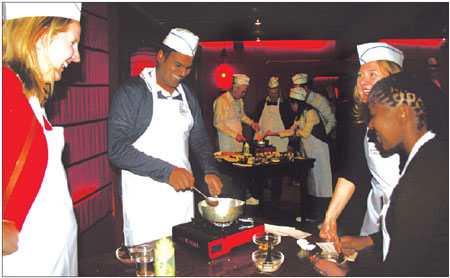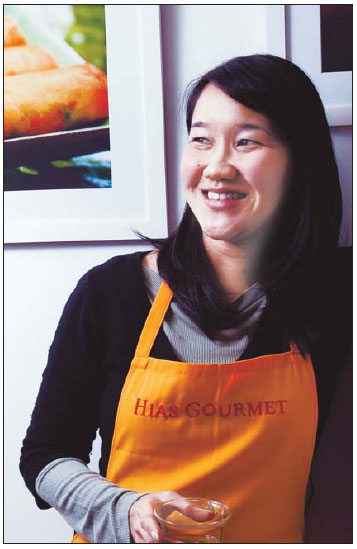Life
Culinary cook-offs help bonding for businesses
By Shannon Aitken (China Daily)
Updated: 2011-01-24 11:08
 |
Large Medium Small |
|
 Amateur chefs take part in the Iron Chef Cooking Challenge. [Photo/for China Daily]
|
When people think of team bonding activities, the first image that usually comes to mind is someone standing with their eyes closed, arms folded across their chest, falling trustingly backward into the out-held arms of their co-workers.
| ||||
Hias Gourmet, founded by culinary devotee Adlyn Adam Teoh, is using the good old-fashioned technique of food to build bridges between people.
Before she founded Hias Gourmet in Beijing in 2007, Teoh was working in Minnesota in the entirely different, un-gourmet profession of engineering, focusing on medical manufacturing and technology.
|
 Hias Gourmet founder Adlyn Adam Teoh says passing her profits to charity makes her happy. [Photo/for China Daily]
|
After coming to China for a year to study Chinese, she realized there were more satisfying things in life for her.
Of Malay parents and having grown up in Borneo and Kuala Lumpur, Teoh was no stranger to Asian cuisine - her time in China only further fuelled her love of the epicurean.
"I knew that this was what I was passionate about and I realized I wanted to share that with people," she said.
Things started slowly, with just a handful of culinary tours around Beijing and other places in China.
Now, however, Hias Gourmet is attracting foreigners from all over the world and has sparked interest from government officials here in China.
Among Hias Gourmet's favorite events are its culinary team building activities. Rather than just hosting run-of-the-mill corporate workshops, Teoh challenges her clients with fun events inspired by TV programs such as Iron Chef and The Amazing Race.
In the Amazing Food Race, teams discover the hutong of Beijing by way of interesting culinary challenges.
"People go around on foot or whatever mode of transport they want - we've done bicycles and sidecars. We plan it for them and then they go on a food race around Beijing," she said.
"We try to introduce food that people haven't been exposed to. So, it can be anything from making dumplings as creatively as you can to going to a wine bar and tasting wines, to going to a market to buy things and then bringing them back to cook with. It's a lot fun."
By far the most popular event is the Iron Chef Cooking Challenge. In average group sizes of 12 to 20 people, contestants compete for such prizes as the best tasting food, the most creative food and the best teamwork.
"These can be done wherever the clients want to have it - near their hotel or offices. They don't have to travel for an hour to get to the activity," explained Teoh.
No event is the same as venues change depending on what the client wants. This makes for a busy schedule constantly creating new experiences for each event.
"We rent kitchens, we rent restaurants, we rent courtyards," said Teoh. "If it's an empty venue, we bring our own chefs and we use different chefs depending on what people want. We usually have a basic chaocai chef and we sometimes have specialist carving chefs, or pastry chefs for things like dumplings."
Hias Gourmet is growing and there are a lot of new experiences on the books for 2011, including both professional and social cooking classes, as well as culinary tours such as to the ancient city of Pingyao, during which guests will visit a cheese factory and an artisanal vinegar factory.
Refreshingly, however, Hias Gourmet's goals are not to become a multi-million-dollar enterprise with branches in every corner of China. Teoh said she wants to keep things personal and meaningful.
"We use our profits to give to projects in Sichuan, the home province of UNESCO's gastronomic city, Chengdu. Working with charity foundation Jolkona, we support education, health and the environment, such as helping pay for children's schooling," Teoh said.
"I feel sometimes we have not done enough, but now everything is coming together and this makes me happy."
| 分享按钮 |


